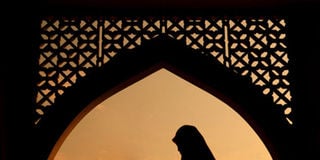Itkaaf: Muslim tradition erased by lockdown

What you need to know:
Eid is forthcoming! The last 10 days of Ramadan(Itkaaf) began on May 14 and Muslim brethren seem to be missing out the rewards because of lockdown, writes ABDUL-NASSER SSEMUGABI.
For the last four years, Mudathir Muwonge, in his early 20s, used to spend the last 10 nights of Ramadan at Kibuli Mosque deep in worship.
He was replicating Prophet Muhammad, who used to vacate his home in the last 10 days and camp at the mosque.
That tradition called Itkaaf, can be done any time but it is special during Ramadan. So special that even a newlywed couple is not allowed to discuss anything romantic while in seclusion in the mosques.
Muwonge speaks of that practice with nostalgia because he, like millions of Muslims across the globe, are not able to isolate themselves from worldly distractions to worship their Lord. Not only are they locked in their homes at night under curfew, but the mosque are also closed, as one of the global responses to the coronavirus pandemic.
In the last odd nights: 21st, 23rd, 25th, 27th and 29th, Muslims intensify their acts of worship anticipating Laylat al-Qadr, the night of power, in which prayers are answered and one deed is rewarded as if it is done for 83 years.
Bears witness
Last Ramadan coincided with Muwonge internship at Kibuli Hospital, ahead of his final-year exams at Kyambogo University. He dedicated the last 10 nights in the mosque asking Allah to enable him to pass his exams and get a job, immediately.
“I got exactly that,” says Muwonge, who was retained to work in the hospital’s accounts department.
This year he had other ambitions to pray for. But “Now I have to worship from home, amid the distractions of others who might be doing other things. It’s hard but I will try.”
Hot tips
Itkaaf is only done at mosques, but Sheikh Yahya Kakungulu, director of Sharia at Uganda Muslim Supreme Council, advises Muwonge and others that if you cannot have something, do not lose it entirely.
“If you can isolate yourself in a room at your home, do that, so that you don’t miss out on the immense rewards,” he says.
“Read the Koran, do supplications, address all your needs to Allah. But please do not be tempted to sneak into mosques. We need to stay safe.”
To emphasise his point, he invoked Surah An-Nisa (4:59) from the holy Quran: “O you who have believed, obey Allah and obey the Messenger and those in authority among you. And if you disagree over anything, refer it to Allah and the Messenger, if you should believe in Allah and the Last Day. That is the best [way] and best in result.”
Eid prayers at home?
When the lockdown had just been announced, Christians could not imagine an Easter without going to church and festivities. Eventually they faced it. The current 14-day lockdown ends on Tuesday May 19, about three days before Eid-el Fitri. But there are no signs that temples will be open to the public.
So Sheikh Kakungulu advises Muslims to observe Eid prayers in their homes. “You shall do the prayers with your family and if a neighbour is to join you, ensure you observe social distance.”
Eid prayers are followed with a sermon. But not many Muslims can deliver a genuine sermon. The cleric advises they perform the prayers, as they have been doing daily, and forego the sermon.
Since the lockdown begun, Christians have been following church sermons and prayers streamed live into their homes via television or the internet.
And the innovations
But Muslims are not about to embrace such innovations.
“There are so many issues with that technology. You can’t follow the Imam if you can’t see him physically, or can’t see someone seeing him physically,” Sheikh Kakungulu explains.
“By the way, what if the system breaks down due to power or internet, in the middle of the prayer, what do you do?”
He adds: “The Prophet is our main source of reference. We use technology if it does not contradict the Sharia.”
In his parting shot, the Sheikh reminded Muslims to avoid anything that may expose them to danger.
“These restrictions are for our health, our benefit. Let us observe them and Allah will deliver us from this bondage.”
Itkaf for women
1. A woman can perform itkaf for gaining rewards and coming closer to Allah. If she is married, she will need the permission of her husband to perform itikaf.
2. Itikaf is also sunnah for women in the last 10 days or Ramadan (from sunset on the 20th of Ramadan until the crescent of Eid is sighted), or if she does it any other time. If a woman does itikaf for less than 10 days (for example, 3 or 4 days in the last 10 days of Ramadan) then this will also be considered as a nafl itikaf.
3. She will have to perform itikaf in the specific place where she prays her salah at home. If there is no such specific area then she can appoint a specific place in her home and make itikaf in that area.
If a woman prays salah in one portion of her home, but wants to make itikaf in another portion of her home, then before sitting in itikaf she should make the intention [niyyah] that from now on she will pray salah in this place then this will be correct and permissible for her to do so.
A big room cannot in its entirety be designated for itkaf , but a small room can. However, a space comfortable enough for her to sleep, eat and sit can be designated in a big room for itikaf. This area will be like a mosque for the woman. She cannot exit this area without a permitted excuse.
-idealwoman.org




